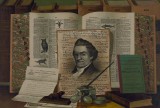How ‘Close’ Is Your ‘Proximity’?
From The New Yorker to BuzzFeed, the Irksome Phrase Still Thrives After 150 Years of Redundancy
The warning echoes beneath the girdered ceiling of Boston’s South Station, and in the cramped bustle of New York’s Penn Station, on a TSA loop of repeating announcements: “Keep personal items in close proximity.”
Any prerecorded phrase, repeated often enough, can drive one mad. But that last two-word phrase is especially wretched.
“Close proximity” irks me viscerally, like chewing tinfoil. We are bombarded with it daily, not just by the TSA in train stations and airports, but also in the news, and even in literature.
For starters, it is redundant. Is …










